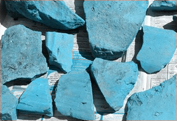|
Did anybody see ‘History Hunters’ on Channel 4 a few weeks back with Tony
Robinson and Mick Aston from Time Team fame? I didn’t, but John Barker
certainly did, - The Border reivers is one of his pet subjects. John was so
concerned that I had missed the show that he gave me the web site address. The
47-page document I downloaded makes fascinating reading. Here are some snippets.
Murder
From the 12th to the 16th century, the land straddling the border between England and
Scotland was rife with thievery, cattle rustling, extortion and murder, committed by men
from all social classes. As their legacy, they gave us the words
‘blackmail’ and ‘bereavement’. But they were also the inspiration
behind probably the most important ballards of the English language. And their most
prestigious promoter was the writer Sir Walter Scott. In the programme, 3 teams of
‘History Hunters’ examined the historical truth behind some of these
ballads. The members of the teams are all descendants of the great
‘reiving’ families who were great riders with ‘lang spear’ and
‘steill’ bonnet’.
Debatable Lands
The border remained fairly constant after the middle of the 12th century, and both the
English and Scottish governments encouraged settlement. As a result, the area became
well populated, but with the consequence that the poor land was unable to support
them. Theft became endemic on both sides, the local families believing that their
‘reiving’ was lawful trading and not theft. Between the Scottish and
English Middle Marches was an area of unclaimed land about 12 miles long, which became
custom for both sides to pasture their sheep and cattle. It soon became a sanctuary
for fugitives, outlaws and murders, who used the area as a base for their marauding.
To put a stop to this mayhem, James I called for an end to hostilities, and in 1603 (his
English coronation year) proclaimed the area should be divided. The result was a
5-mile stone and earth wall known as Scots Dyke, part of which can still be seen near
Canobie.
The Match
Calendar of Local Border Papers, 18th May 1599 – (extract). ‘In my last
letter I wrote what I knew of Mr Rydley’s death: but this now is the truth as follows
– Mr Rydley knowing the continual haunt, the great thieves and arch murderers of
Scotland, especially them of Whythaugh, had with the captain of Bewcastle, went about by
some means to catch them in English ground, ... and hearing that there was a football
playing and after that a drynkyng hard at Bewcastle house, betwixt 6 of those Armstrongs
and 6 of Bewcastle, he assembled his friends and lay in wait for them. But the Scots
having secret intelligence, suddenly came on them and have cut Mr Rydley and Mr Nycol
Welton’s throats, slain one Robson tenant of her Majesty’s, and taken 30
prisoners, ... and many sore hurt, especially John Whytfield whose bowells came out, but
are sowed up agayne, ..and as yet lyveth’ (I have copies of the full document if
anybody wants one.)
Doughty Mill
Here is the latest picture of the excavation work we carried out in the Arley valley
last year (see Newsletter No. 17). Hopefully we will return again this summer.

Next Meeting
(Wednesday 3rd February at the history shop at 7.30 pm as usual.) Two years ago I asked
Yvonne Web if she would have a look at the Prehistoric and Roman artefacts in store at the
History Shop as part of the work we were doing for the Sites and Monuments Record.
She gave me a listing of nine prehistoric items but the provenance of these was not clear,
as I reported in Newsletter No. 2. At the next meeting Yvonne has agreed to bring
them along for us to look at. It is also the AGM and this year we are looking for a
new Chairperson, as Eddie is stepping down after 5 years service. If you are
interested please contact me before the start of the meeting.
Hope to see you at the meeting - B.A.
|



